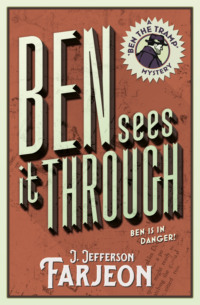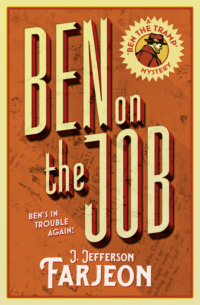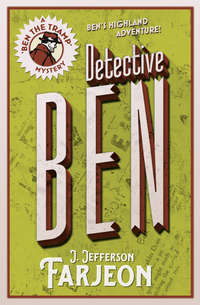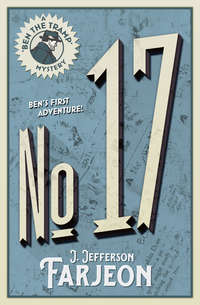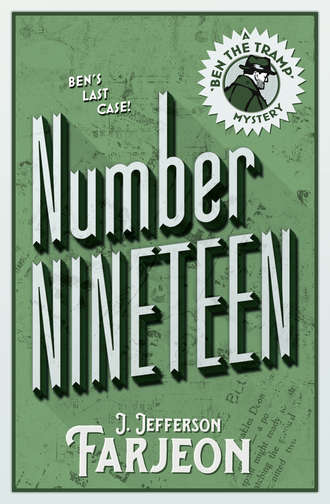
Полная версия
Number Nineteen: Ben’s Last Case

J. JEFFERSON FARJEON
Number Nineteen
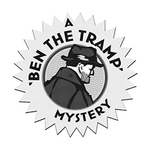

Copyright
COLLINS CRIME CLUB
An imprint of HarperCollinsPublishers Ltd
1 London Bridge Street
London SE1 9GF
www.harpercollins.co.uk
First published in Great Britain for Crime Club by W. Collins Sons & Co. Ltd 1952
Copyright © Estate of J. Jefferson Farjeon 1952
Cover design by Mike Topping © HarperCollinsPublishers Ltd 2016
Cover background images © shutterstock.com
A catalogue copy of this book is available from the British Library.
This novel is entirely a work of fiction. The names, characters and incidents portrayed in it are the work of the author’s imagination. Any resemblance to actual persons, living or dead, events or localities is entirely coincidental.
All rights reserved under International and Pan-American Copyright Conventions. By payment of the required fees, you have been granted the non-exclusive, non-transferable right to access and read the text of this e-book on screen. No part of this text may be reproduced, transmitted, down-loaded, decompiled, reverse engineered, or stored in or introduced into any information storage and retrieval system, in any form or by any means, whether electronic or mechanical, now known or hereinafter invented, without the express written permission of HarperCollins.
Source ISBN: 9780008156060
Ebook Edition © August 2016 ISBN: 9780008156077
Version: 2016-06-28
Table of Contents
Cover
Title Page
Copyright
Chapter 1: Trouble on a Seat
Chapter 2: More Trouble on a Bed
Chapter 3: Mr Smith v. Mr Jones
Chapter 4: Transformation Scene
Chapter 5: Behind the Locked Door
Chapter 6: Very Brief Respite
Chapter 7: Conversation on a Doorstep
Chapter 8: The Thing
Chapter 9: Caller No. Two
Chapter 10: Conference on the Stairs
Chapter 11: Discoveries in the Dawn
Chapter 12: Ben Receives Instructions
Chapter 13: Cobwebs
Chapter 14: Overture to 10.30
Chapter 15: 10.30
Chapter 16: Where’s Mr Black?
Chapter 17: Lady No. Two
Chapter 18: Oasis
Chapter 19: Exchange of Information
Chapter 20: The Enemy Closes in
Chapter 21: The Locked Door
Chapter 22: Beyond the Cellar
Chapter 23: Who’s the Lady?
Chapter 24: Ben Bounces
Chapter 25: The Owl
Chapter 26: Conference at Top Level
Chapter 27: Topsy-Turvy
Chapter 28: The Nightmare Chimes Out
Keep Reading …
About the Author
Also in This Series
About the Publisher
1
Trouble on a Seat
On a certain grey afternoon he was destined never to forget—he had a packet of them, and he called them his Album of ’Orrers—Ben paused before a park seat, wondered whether to sit down on the unoccupied end or to move on to the next, decided to move on to the next, changed his mind, sat down where he was, and thereby sealed his doom.
It was a pity there was somebody else at the other end of the seat. Ben liked to be alone, because when you’re alone no one can bother you, can they? But the man at the other end did not look the bothering kind, and as he was busy with a notebook and it was nice and quiet here, Ben could go on thinking. You could just hear the London traffic in the far distance, but only just, and with all this grass and trees about, well, you might almost be in country, mightn’t you?
What was Ben thinking about? If the man at the other end had glanced up from his notebook and made a guess, it was a thousand-to-one chance he would have guessed right, although it so happened this man was good at guessing. When Ben was passing through emotion, and he very frequently was, his thoughts were as plain as the Egyptian Pyramids, but during his contemplative periods there was no knowing what lay behind his glazed, expressionless eyes, which concealed their treasure as the surface of a mine conceals its wealth.
The safest guess was cheese. Ben loved to think of cheese. Though, of course, that came a long way behind eating it. Another possibility was corpses. These he never thought of from choice, but they had a habit of slipping into his mind from that lavish Album of ’Orrers, and—queer, this—there was a sort of fascination about them! You couldn’t get away from it. You know—once you’d done with them. For instance, take that one he’d found in the cellar in Norgate Road, or the one he’d spoken to on the Embankment, or the one he’d tumbled on in the attic of No. 17—only, of course, that hadn’t kep’ bein’ a corpse, ’ad it? You didn’t need a war for Ben to find ’em!
But Ben was not thinking of either corpses or cheese as he sat now on the park seat. He was thinking of numbers, separating the lucky ones from the unlucky ones in the light of his own experience. Seventeen you might call the plum! He wouldn’t live in a house numbered seventeen not if you paid him a couple of quid! He always gave the number a miss when he counted. You couldn’t call fifteen nice, either. That cellar at Norgate Road had been in Number Fifteen. Thirteen—well, of course, you couldn’t ever expect Thirteen to behave itself. He’d known a couple of shockers. And the day he’d found fourteen fag-ends he’d bust his braces, so fourteen was no good, either. Bending dahn fer the last one, that was. Funny how all the ’teens seemed to be against you!
No, the small numbers were best, you couldn’t get away from it. Digiots they was called, wasn’t they? Take Five. That was nice. It was at a Number Five that a girl had nearly fallen for him. Not quite, but nearly. They never did quite. Golden hair, she’d had, and my, what a wink! Then once he’d bet fivepence on a horse, the only time he’d ever won. And that little kid he’d helped across the road only yesterday. She was five, she told him, when he’d asked her. Yes, Five was nice. Very nice. You couldn’t get away from it.
Ben was so busy thinking of the number Five that he did not hear a car stop in a narrow road near where he was sitting. Why should he have paid any attention to it, if he had? It was a quiet road, and the car stopped quietly, as though the driver did not want to disturb the peaceful serenity of the afternoon, or of the two men on the seat, one intent on his notebook, the other gazing at nothing. The driver himself revealed no special characteristic as he began to stroll casually towards the seat. He had dark brown hair and a small moustache. His suit was light grey, and he carried a camera.
He approached quietly. Very quietly indeed. His first view of the two men was of their backs, which meant that neither of them had any view of him at all. He paused when he was within a few yards of them, regarding their backs with, ostensibly, only a vague interest. After a few seconds, during which Ben went on thinking and the man at the other end of the seat went on making his notes, the newcomer turned his head to glance back towards the road. Then he glanced from one side to the other. No one else was in sight. If this gratified the newcomer his expression did not register the fact. His expression, indeed, was rather bored.
Continuing his stroll, he veered a little in his route and came round Ben’s end of the seat. Ben saw him now out of the corner of his eye, but was still too absorbed in his recollection of the little girl of five to be diverted by a glimpse of a casual stroller. It was not until the newcomer had walked a little farther on and, turning, raised the camera he was carrying that he was in full view. Ben lifted his head just as the camera clicked, and a distant clock chimed four.
‘Wozzat for?’ he blinked. ‘Telervision?’
‘No. Just for my private collection,’ answered the photographer, with a faint smile.
‘Oh! Well, if my phiz is goin’ in, yer better keep it privit!’ grunted Ben.
‘I hope you didn’t mind? I just couldn’t resist. I specialise in studies in contrast.’
His turn to take the snapshot had brought him facing the direction from which he had come, and now he began walking back towards the road. Unless he had left his car especially to get this picture, which on the face of it seemed hardly likely, his short stroll appeared somewhat pointless. The man with the notebook had stopped writing at the sound of voices, without looking up. Now he suddenly closed the book and slipped it in his pocket. He was bringing out his cigarette-case as the photographer was returning by the seat, passing it this time at his end.
What happened immediately afterwards was never completely clear in Ben’s mind. One obvious reason was the particular nature of the happenings, but another lay in the fact that the photographer had disturbed his thoughts and he was trying to get back into them. What had he been thinking about? Oh, yus, that little gal and Nummer Five. Nice little kid, and no mistake. He liked ’em that age. They knew just enough to get on with and they hadn’t learned yet to be cheeky. Not that this little girl looked like ever getting cheeky. No, she wasn’t that kind. He’d watched her standing there, waiting to get across—fancy lettin’ ’er aht alone, ’er mother didn’t ought!—and when he’d gone up to her she had put her hand in his, trusting him like he might be anybody. He’d like to have bought her some sweets, but he hadn’t no coupons, and even if he had, how far would tuppence go? Besides, nice little girls weren’t supposed to take things from strangers, or even to talk to ’em, and there was that there time when he’d said it was a nice day to a small child, brown hair she had, and her mother had pulled her away sharp …
Even more sharply, Ben pulled his mind back from the past to the present. Oi! Wot was ’appenin’? That photographer bloke hadn’t gone. He’d stopped again—come round the back of the seat—and was standing behind the man with the notebook, with his hand raised … Oi! Look aht!
Ben tried to shriek the words, but no words came. They stuck in his throat, which had become constricted with horror, and before he could make a second effort the man slumped forward with a knife in his back. Out of a corner of the glazed eye that was glued on that murderous knife Ben glimpsed the notebook slipping down to the ground.
‘Corse, this ain’t ’appenin’!’ decided Ben, making a miserable and familiar effort to wipe out reality. ‘Yer don’t go murderin’ folk not in public daylight, and afore witnessesses! Well, do yer?’
The answer came in the form of the murderer’s face. It suddenly loomed larger than life before Ben’s own. It looked so large it seemed to fill the universe.
‘Wot I gotter do,’ thought Ben, ‘is ter ’it it.’
With a face that size, it was impossible to miss. But just as Ben’s throat had gone off duty when it was needed, so now did Ben’s fist. He tried to raise it, and found it powerless.
‘I gorn numb,’ he concluded.
He had. Not only his fist, but every part of him. The sardonic face was draining all the strength out of him, and seemed now to be curling round him, as though he were imprisoned inside it. If only he could get free for a moment, lummy, he’d show it! Hit and run—hit and run—hit and run! But there was no escape from this facial cage, and even the moustache had grown to a mile in length and seemed to be binding him … And now wasn’t there a second face? Smaller—vaguer—but somewhere about. And what was that prick in his arm? Had that happened this moment, or very long ago? Long ago—yes, of course—very long ago. Because after that—don’t you remember—there was that little golden-haired girl. You saw her standing there and wanting to get across the road, and you went up to her and said, ‘I’ll tike yer across, missie,’ and she put her hand in yours, trusting you jest like you might be anybody …
2
More Trouble on a Bed
When Ben opened his eyes he decided that he was still asleep. You often wake from one dream into another, and it was of course quite impossible that he should be lying like this on a bed. Wasn’t he on a park seat, and even if he had rolled off the seat because of something that had happened—and he felt sure something had happened, though his mind was too muzzy to recall just what it was—he would have rolled off on to the grass, well, wouldn’t he? He wouldn’t have bounced into a bedroom, because even though Ben was good at bouncing he couldn’t bounce quite as far as that.
And there was another thing that proved this must be a dream. He could just see the tip of one of his boots, and it wasn’t his boot. His boots were old and shabby; in fact one of them, owing to sundry gaps, could hardly be called a boot at all. You just put your foot in and it came out at the other end. But this boot he could see the tip of—yes, it was the left boot, the one with the gap—had no gap at all. Nor did it look old and worn. It was miraculously complete, and there was even a bit of polish on it. So, well, there you were. It was just another dream.
He hoped it would prove a nice one. He had an idea that the preceding dream had not been so good. If he lay very still, so as not to disturb it, a door might open somewhere and the Prime Minister might come in. And he might say, ‘Don’t move, Ben. I know you’re feeling bad—’ he was ‘—but you did a noble act dashing in front of that car and saving that little girl from being run over. You might of got killed. Well, England doesn’t forget brave acts like that, so we’re going to reward you with Ten Thousand Pounds—’ Yes, that would be a very nice dream.
He closed his eyes, and waited for it. But the Prime Minister did not oblige. A door did open somewhere, however, and suddenly feeling convinced that it did not herald the arrival of anyone so beneficent as a grateful Premier, Ben opened his eyes again quickly, jest to be ready like. Again he saw that impossible, polished toe. He still believed he was dreaming, but he was sure by now that the dream was not going to be a nice one.
The person who had come in had entered by a door behind the bed. He seemed in no hurry—assuming it was a ‘he’—for after closing the door there was no further sound for a full minute. Then the approaching footsteps were resumed, reached the bed, and continued round the foot of it. Then they ceased again, and Ben found himself regarding no longer the surprisingly polished boot but the face above it, and as he gazed, remembrance came flooding back. It was the face of the man with the dark brown hair and the small moustache. The face that had enveloped him before his black-out.
‘This,’ decided Ben, ‘is goin’ ter be narsty!’
For a few moments the two men regarded each other silently. It was Ben who broke the silence.
‘Go on! Let’s ’ave it!’ he muttered.
‘Ah, you have recovered your voice,’ replied the other. ‘Have what?’
‘Wot it’s orl abart!’
‘But you, of all people, should know what it is all about?’
Ben gulped, then tried to steady himself. Things was wobblin’ somethink ’orrerble!
‘I knows a bit,’ he said, guardedly.
‘And what bit do you refer to?’ came the enquiry.
‘Do yer need me ter tell yer?’
‘I am asking you to tell me.’
Ben gulped again.
‘Orl right, guv’ner, ’ere goes. I knows that summon’s bin murdered!’
‘Murdered?’
‘Does it surprise yer?’
‘It’s a nasty word, but—no, I cannot say, truthfully, that it surprises me.’
‘It wouldn’t. See, yer was there, wasn’t yer?’
‘And so, I gather, were you?’
‘I was.’
‘Then of course you will know who did it?’
‘I knows.’
‘Then perhaps you would tell me?’
‘Yer want me ter say?’
‘I should be interested. It was a shocking thing, was it not? Who did do it?’
Ben swallowed, to clear his throat for the next. Of course the man knew Ben knew who had done it, but it is never pleasant to inform a murderer of his crime, especially when there is nobody else about.
‘You did it,’ said Ben.
‘Come, come!’ smiled the man.
‘That ain’t no good,’ retorted Ben. ‘I seen yer!’
‘I’m afraid that is no good, either,’ answered the man, ‘for is it not just what anybody in your position would say?’
‘Eh? In my persishun?’ repeated Ben, blinking. ‘I don’t git yer?’
The man continued to smile. It was one of the least pleasant smiles Ben had ever seen.
‘Please do not disappoint me, my good man. I credited you with some intelligence. Are you speaking the truth? Don’t you really and truly get me?’
And then, all at once, Ben did, and sweat appeared upon his brow.
‘Yer—yer ain’t meanin’—?’ he began, but he was interrupted before he got any farther.
‘Let us go slowly,’ said the man. ‘Sometimes it is not quite wise to say exactly what one means. We have plenty of time, and as this is going to be a long conversation, I think I will take a chair.’
He turned away and walked towards a chair in the corner of the room. How about a dash while his back was turned? Ben had not heard a key turn, so evidently the door was not locked. Yes, that was it! A couple of leaps and then ’ell for leather! He wouldn’t get another chance.
But unfortunately Ben was not in a condition for leaping. He could only leap in spirit; his body refused to oblige. Lummy, he didn’t half feel weak!
‘There is a mirror on this wall,’ remarked the man, as he reached the chair, ‘and I have something in my pocket which would get to the door before you possibly could. As a matter of fact, it would pass through you on its way. Let me repeat my advice. Take things slowly. You may find—if you are sensible—that your position has its saving graces.’
‘Savin’ ’oo?’ muttered Ben.
As the man returned with the chair his teeth became prominent below his little moustache. He smiled with his teeth.
‘Do you know, I rather like you,’ he said. ‘What is your name?’
‘Winston Churchill,’ replied Ben. You might as well die game. ‘Wot’s your’n?’
‘I won’t respond with Clement Attlee. If you want something to call me—’
‘I could call yer plenty withaht no ’elp!’
‘I have no doubt you could, but I suggest Mr Smith. What am I to call you? I confess I find Winston Churchill rather a mouthful.’
‘Orl right. Yer can call me Jones.’
‘That being your real name?’
‘As much as I reckon Smith is your’n!’
‘Very well. Then that is settled—for the moment. I am Smith and you are Jones, and we are discussing the demise—or death, if you prefer simple terms—of a third party who so far has to be nameless.’ He sat down by the bed. ‘Oh, but perhaps you can tell me his name?’
‘Corse I carn’t!’ retorted Ben. ‘’Ow’d I know it?’
‘Well, it occurred to me that you might, since you were so obviously interested in him?’
‘’Ow was I interested in ’im?’
‘That is what I hope to learn, for only lunatics—and I haven’t yet decided that you are a lunatic, though it is a theory—only lunatics attack perfect strangers—’
‘Nah, then, I don’t want no more o’ that!’ interrupted Ben, with anxious indignation. ‘I never seed the bloke afore in me life, and you ain’t goin’ ter put that on me!’
Mr Smith shook his head reprovingly.
‘I fear you are getting me all wrong,’ he said. ‘I am not putting anything on you—or, more correctly speaking, what I put on you need not matter. Your headache, Mr Jones, is what the police may put on you, and that actually is what you and I have got to discuss.’
‘The pleece carn’t put nothink on me!’
‘I wish I could agree.’
‘Well, as I didn’t do it—’
‘Somebody did it!’
‘Yus, but we ain’t torkin’ abart anyone else jest nah, we’re torkin’ abart me, and as I didn’t do it I ain’t got ter worry abart the pleece!’
Mr Smith gave a little sigh, turned his head for a moment towards the door, and then turned it back again.
‘You really are being very difficult, Mr Jones,’ he complained. ‘Here I am, trying to help you—’
‘Oh, ’elp me, is it?’
‘Can’t you see?’
‘I couldn’t see that withaht a telerscope!’
‘You say the most delightful things. My desire to help you increases every moment, and the best way to prove it is to explain to you precisely what your position is, and what the police could put on you if you had the misfortune to meet them. I am afraid we can no longer mince matters, Mr Jones, and we shall have to say exactly what we mean, after all. And, come to think of it, you didn’t mince matters when you attempted to put the murder on me! Not many would forgive you for that, yet here am I, still sticking to you! Now, then, let us begin. You deny, I understand, that you stabbed the man on the other end of your seat?’
‘’Ow many more times?’ growled Ben.
‘One of your troubles, of course, is that you cannot prove an alibi. You know what an alibi is?’
‘Yus. It’s when yer can prove yer wasn’t where they say yer was.’
‘Correct. If ever you write a dictionary I shall buy a copy. And you cannot prove that you were not on that seat.’
‘Come ter that, ’oo could prove I was?’
‘Well—I could!’
‘That’s not sayin’ they’d believe yer.’
‘No, but then I could prove you were, if my word wasn’t good enough.’
‘’Ow could yer?’
‘You have a very short memory. Don’t you remember that, a few moments before the tragedy, I took a photograph?’
‘Lummy, so yer did!’
‘The police might give a lot for a copy of that photograph. Don’t you agree?’
Ben offered no opinion.
‘And then,’ went on Mr Smith, ‘there is something else you ought to know. That horrible knife sticking in the poor man’s back—I had to leave it there, for I had not the nerve to take it out—horrible, horrible!—the police will naturally examine the handle, and they will find your fingerprints upon it.’
‘Wot’s that?’ gasped Ben.
‘You really ought to have wiped them off,’ said Mr Smith, sadly. ‘You can be quite sure that, if I had done the deed, I would have wiped mine off! You might like to make a note of that. Oh, no! Oh, no! I would never have left mine on!’
‘But mine carn’t be on!’ cried Ben, desperately.
‘Not so loud, not so loud!’ admonished Mr Smith. ‘I assure you, Mr Jones, your fingerprints are on that knife. You may deny it till you are blue in the face. It will make no difference. The fingerprints are there.’
‘Owjer know?’


